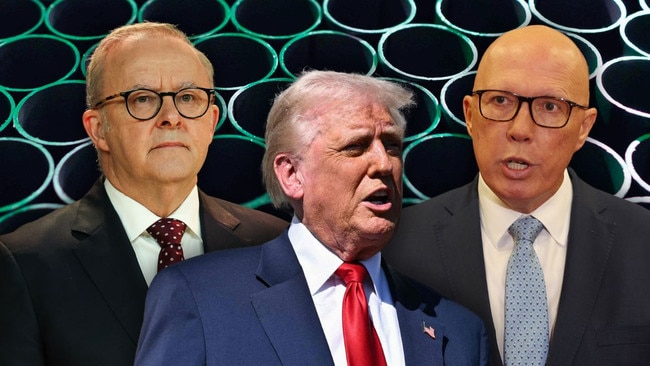
Donald Trump has injected himself into the Australian election landscape in a profound and destabilising way.
There are the obvious direct effects, such as the steel and aluminium tariffs imposed just weeks before the beginning of a federal election campaign demonstrate.
But there are also indirect consequences. The intangible.
A new lens is being cast over the domestic political contest with the uncertainty and unpredictability of Trump for the global economy and geostrategic situation. This presents deep risks for both Labor and the Coalition.
This is no longer a case of irrational “Trump derangement syndrome”. It is the consequential reaction to real policy and political outcomes.
There may be two major parties contesting the election but there are now three boxers in the ring. Anthony Albanese has decided that rolling over and playing dead in the face of Trump’s harrying behaviour will not serve either his or the nation’s interests.
There is a view that there may now be political advantage for the Prime Minister in taking Trump on. His language in response to Trump’s rejection of Australia’s request for an exemption was the strongest he has used.
But it is limited to the rhetorical. There is no reciprocal action planned. And for the simple reason that because of the erratic nature of his method, there is still a chance he may change his mind.
While this is unlikely, for Albanese it’s a case of just having to bat on. The Prime Minister has a fine line to walk. His response has to be accountable beyond the obvious partisan political necessity.
He also must consider that even if he wins the election, Trump won’t stop being an issue.
The suggestion that there could be political recovery in being more belligerent, as has been the case with Canada, misreads the relationship and the lesser magnitude of what Trump is imposing on Australia.
Trump isn’t threatening Australia’s sovereignty.
Incoming Canadian prime minister Mark Carney has seen domestic support galvanise behind his left-wing government through a defiance of Trump.
On the surface, it would be easy to assume that Albanese might have taken some cue from the Canadian response. Domestically, he will be happy to have Australians blame Trump rather than him for the tariffs. But there are bigger issues that require Albanese to take a more responsible and cautious approach. AUKUS is one of them.
What is assured in this tempest of uncertainty is that this issue will percolate through the Australian election. As will the broader and deeper issue of Trump himself and the brand of politics he represents.
This has the potential to cut both ways. For Albanese, the risks are obvious. Not only will he need to manage the Australia/US relationship beyond the tariff issue, he will need a domestic response to the potentially broader and more problematic global economic fallout, and the secondary economic effects on Australia’s economy.
Generally, if there is turmoil in the markets, with a knock-on effect to superannuation balances, there will be an even sharper focus on economic management during the campaign. This has the potential to benefit the Coalition, if it is managed well. The Coalition is of the belief that voters also rate Peter Dutton as being better in dealing with Trump than Albanese. This is obviously untested.
But the perception becomes the critical issue for Albanese. Will voters accept Trump is to blame entirely or will they favour the Coalition argument the government has responded incompetently in its failure to secure an exemption?
If the conversation shifts to fears of the global economy and who would be better to manage that, there is opportunity for Dutton. Wokism fatigue and the natural political realignment is an issue not yet resolved in the Australian context. And this is where Albanese is most at risk.
There has been a global right wing turn among men which is unmistakeable. Trump has become their avatar. Labor, and in particular Albanese, will need to avoid anything that could cause that trend to accelerate.
If the left wants to learn anything from Trump’s ascendancy, it is the risk to its working class base from buying into the culture wars from a progressive perspective.
For Albanese, the lesson came earlier following the failure of the voice referendum.
Trying to predict what role Trump might play, either directly or indirectly in the Australian election context is impossible. But it is a factor that has thrown uncertainty into both campaigns.
The risks for Dutton are no less. A Coalition source this week was quoted as saying Trump winning was good for Dutton, Trump governing is bad for Dutton. This has some substance.
While Dutton is acutely aware of the dangers that he will be assessed by voters through a prism of Trumpism, there are aspects that remind people of Trump. Dutton’s political persona as the tough guy plays to this.
While Dutton has been seeking to avoid a culture war approach, there are synergies with the Coalition’s campaign slogan – getting Australia back on track – and the Make America Great Again movement.
There is a potential for this to be exploited by Labor to undermine any positive message Dutton might seek to convey.
At the very least both sides acknowledge that Trump is the wildcard in the Australian federal election context.
Anything could happen and most probably will.



